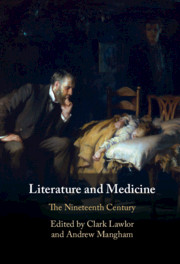Book contents
- Literature and Medicine
- Literature and Medicine
- Copyright page
- Contents
- Contributors
- Acknowledgements
- Introduction
- Part I Epistemologies
- Chapter 1 Writing Realism in Nineteenth-Century British Literature and Medicine
- Chapter 2 ‘Dissecting Piece by Piece’
- Chapter 3 Exhibiting Bodies
- Chapter 4 Anatomical Culture, Body-Snatching, and Nineteenth-Century Gothic
- Part II Professionalisation
- Part III Responses
- Index
Chapter 2 - ‘Dissecting Piece by Piece’
Experimentalism in Late-Victorian Fiction
from Part I - Epistemologies
Published online by Cambridge University Press: 04 June 2021
- Literature and Medicine
- Literature and Medicine
- Copyright page
- Contents
- Contributors
- Acknowledgements
- Introduction
- Part I Epistemologies
- Chapter 1 Writing Realism in Nineteenth-Century British Literature and Medicine
- Chapter 2 ‘Dissecting Piece by Piece’
- Chapter 3 Exhibiting Bodies
- Chapter 4 Anatomical Culture, Body-Snatching, and Nineteenth-Century Gothic
- Part II Professionalisation
- Part III Responses
- Index
Summary
Late-Victorian novelists responded variously to experimental physiology during a period of disciplinary upheaval in the mental sciences. In the 1860s, leaders in this field included polymathic philosophers such as Herbert Spencer and George Henry Lewes. By contrast, later researchers tended to be university-trained scientists using specialized techniques. In the 1870s, British neurologist David Ferrier and John Hughlings Jackson used clinical studies and controversial animal experiments to link parts of the brain with specific movements, emotions, and behaviors.
Some novelists reacted positively to these scientific developments. French naturalist Émile Zola embraced both evolutionary theory and experimental physiology, opining that novelists must ‘dissect piece by piece’ their fictional characters. Zola’s British admirers and imitators included George Gissing, George Moore, and Thomas Hardy.
Authors of genre fiction responded more ambivalently. Sir Arthur Conan Doyle, Grant Allen, and H. G. Wells favored literary forms that mimicked the scientific method. Wells’s scientific romances tested an imaginary hypothesis (say, human invisibility) against a series of controls, while Allen’s and Doyle’s detective fiction borrowed diagnostic techniques from Victorian medicine. Late-Victorian Gothic novels, meanwhile, explored anxieties accompanying scientific ‘progress’. Taken together, these examples suggest how Victorian fictions responded productively, if sometimes critically, to experimental practices.
Keywords
- Type
- Chapter
- Information
- Literature and MedicineThe Nineteenth Century, pp. 38 - 55Publisher: Cambridge University PressPrint publication year: 2021
- 1
- Cited by

